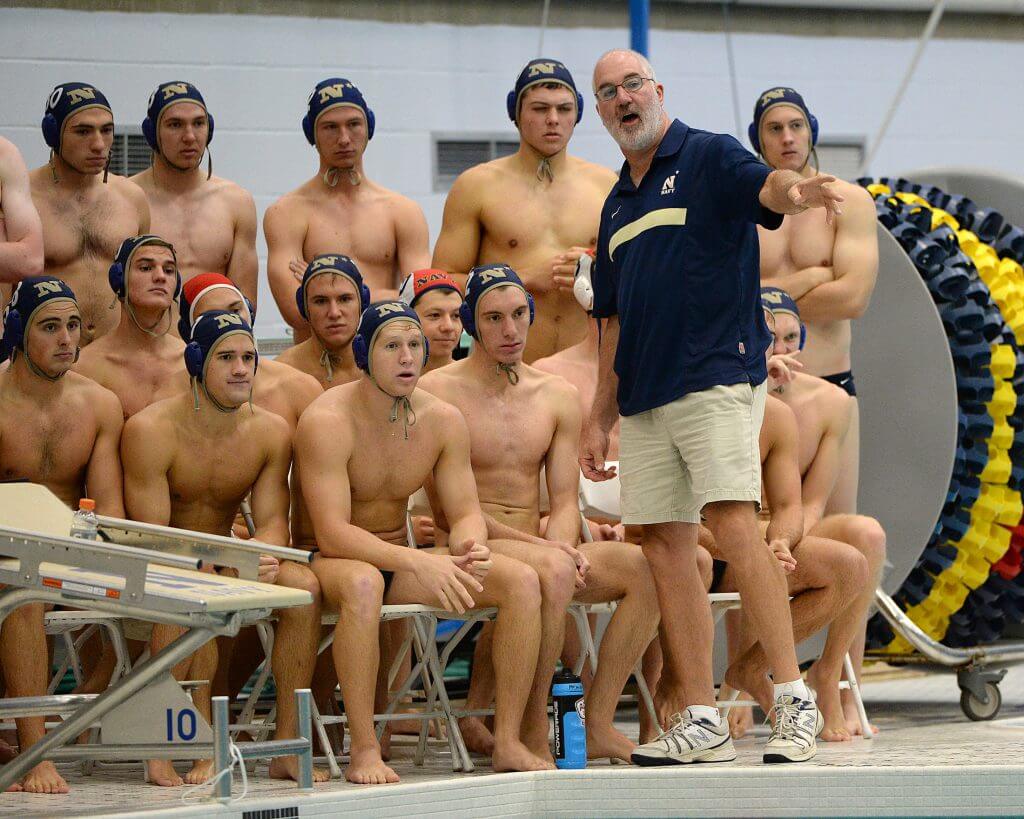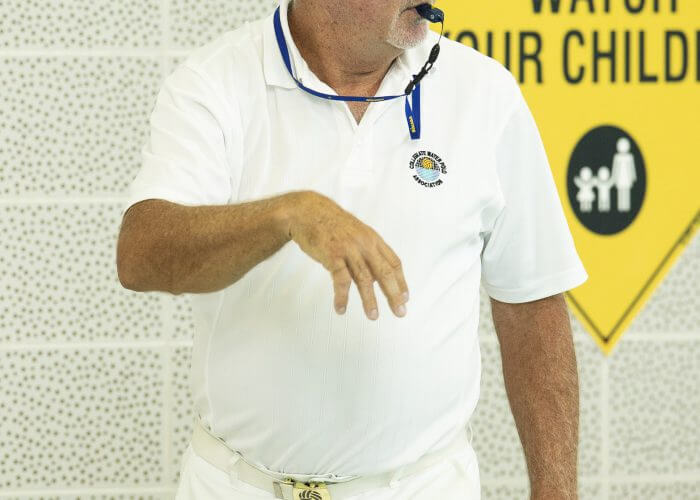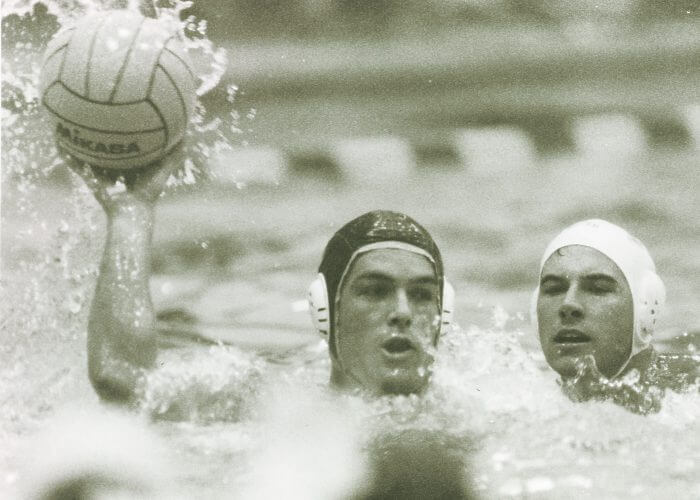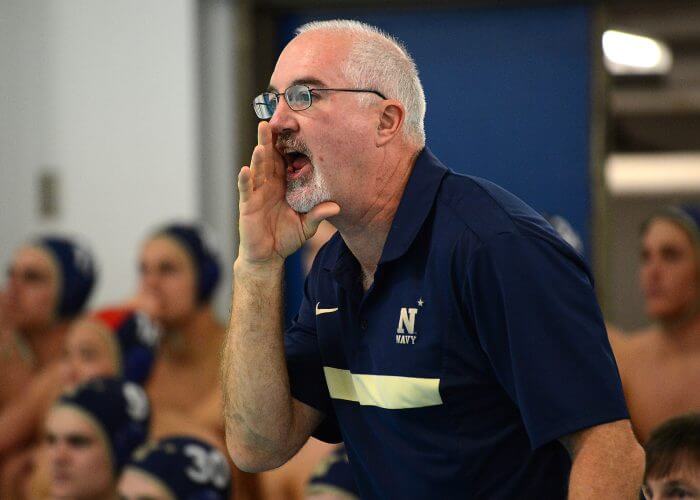On The Record with Mike Schofield, Legendary Navy Water Polo Coach Turned Referee

By Michael Randazzo, Swimming World Contributor
BALTIMORE, MD. Those who don’t know Mike Schofield cannot appreciate the rich history of East Coast water polo. From 1985 to 2013 Schofield led the U.S. Naval Academy’s men’s water polo program to an impressive 13 NCAA appearances and 630 wins—still the most victories by any coach in Navy Athletics history. After stepping down from the Middies mid-season in 2013, Schofield returned to the sport relatively quickly as a referee. It was a surprising turn of events; Scofield—like many coaches, possessor of a fiery temperament—was not known to be a friend of the men in white.
What there is no disputing is the success that he achieved over an illustrious career in Annapolis. When Schofield, a 1979 graduate of the University of Pittsburgh, arrived in Annapolis in 1982, Navy had just elevated its men’s water polo program to varsity status. As an assistant to Lee Lawrence for two years, Schofield helped lay the foundation for the great Middies teams he then coached to nine NCAA tournaments in 11 years (1984-1994), only missing out in 1985 and 1989. For his efforts, in 2014 Schofield was inducted into the Collegiate Water Polo Association (CWPA) Hall of Fame.

Mike Schofield recently on the Johns Hopkins pool deck. Photo Courtesy: Greg Bartram
Five years after his unexpected departure from coaching, Swimming World caught up with Schofield, who was refereeing the 2018 Division III Eastern Championships held October 13 and 14 at Johns Hopkins University. Appearing entirely at ease, he spoke about his contentment with his new role in polo, Luis Nicolao and Tom Popp—two of the best athletes to ever don Navy’s blue and gold—return to Annapolis this year as Middies’ head coach and top assistant, and how the sport in America is greatly in need of inspirational leaders to fulfill its promise.
– Is there life after Navy, where you are still the winningest coach in U.S. Naval Academy history?
Yes, absolutely (laughs). I’m actually refereeing way more than I need to or should be. [But] it’s still fun to see a lot of the same people I enjoy spending time with.
– How often do you don your referee whites?
A ton in the fall, a ton in the spring but not a whole lot in the summer. Men’s season, women’s season, NCAA, a lot of local club stuff. Some high school stuff in Baltimore. Every now and then I get out west to San Diego to go to Randy [Burgess’] thing [Polo in Paradise water polo camps].
– It seems hard to believe that you are totally out of coaching.
I haven’t done much coaching at all, believe it or not. Probably the first time I’ve coached in two years, I went in last week and did a ninety-minute ball handling session with a bunch of 18U [players] at Navy. I may do a little more of that going forward, I don’t know. I still like doing all that.
I miss the people but I don’t miss the work. Generally, when you put your white stuff on and referee, when you walk out of the building you take a lot less emotional baggage with you.
– There are some who might suggest it’s ironic that you went from demonstrative coach to calming referee.
A lot of people have found great humor in it! (Laughs). I actually refereed before I got to Navy. When I got out of college I refereed in what’s now the CWPA, but back then it was set up a lot differently. I refereed the Eastern Championships in 1980 and 1981 before going to Navy.

A young Luis Nicolao. Photo Courtesy: Naval Academy Athletic Association
– Two of the more accomplished players you coached at Navy are now back there leading your old program. What are your thoughts about Luis Nicolao and Tom Popp together again as the head and assistant coaches for the Middies?
The common denominator is it was always a lot of fun to be around Louie. And that hasn’t changed. It’s inbreeding at its best when two guys—Louie and Tom, who went to the same high school, played for Larry Rogers at Bellarmine, came here, had four great years at [Navy] as players—that they ended up together again.
– Which only seems right because a strong Navy is essential for healthy competition in the East.
I think so. You want everyone to be as competitive as possible. But Navy probably has the best combination of facilities—and a good location. Over the years their facilities have probably hosted more water polo than everyone else in the East put together. it’s nice to have that hub that not only serves the collegiate community but age group and high school. They’ve done a lot of international stuff there [and] national team stuff there.
It’s a cornerstone facility in a cornerstone location for a lot of [water polo] stuff. And, you obviously want that.
– The challenge with recruiting athletes to any of the service academies is that the expectations are so high, it seems like there’s no time for fun and games.
You’d be surprised at how much fun they’re able to have. And that’s a good thing. We don’t want to bring in anybody who’s going to be miserable. They find ways to enjoy themselves, and that’s part of the dynamic that I was most proud of—not that I had anything to do with it. Like any other team and any other sport, that’s their gang, that’s their clan. They spend time together and find stuff to do and get in trouble together—[and] try to stay out of trouble together.
Kids wouldn’t have stayed at Navy at a high graduation percentage if they weren’t enjoying it. The key is: when they would get in trouble and they were maybe on the bubble to get kicked out for some sort of conduct issue, the first question is: What do I need to do to stay? I’ll take my punishment; what do I need to do to keep on fighting?
If they didn’t want to be there that wouldn’t be the first question.
– Of course, when those who attend Navy are not there for just an education, they come to Annapolis out of a sense of duty to their country.
They always try to instill that right away with the plebes from Day One; you’re there to serve something bigger than yourself. That’s the mantra.
You have the opportunity for a life-changing experience over four years that will put you in position to do so many things that nobody else gets to do. The old commercial [that aired in 2002]: “Accelerate Your Life” … it’s unbelievably true. I had two younger brothers who went [to the Academy], there are umpteen hundreds of kids that I coached there, and to watch what they do from the time they graduate—not to mention the four years they’re with us—what some of these guys have done since they graduated five, ten, fifteen, twenty, twenty-five, almost thirty-five years [later]; some of these people are doing things that you can’t even get your head around.

How some might remember Coach Schofield. Photo Courtesy: Phil Hoffmann
In the military, out of the military, in terms of some of the corporate work they do, the work they do for veteran. A couple of my alums are doing phenomenal things for Wounded Warriors, running charities.
It blows my mind. These were guys who were 18 and didn’t know that a 6-on-5 was when they got there.
We have our 35th anniversary of our first varsity team next weekend [in Annapolis]. It’s 35 years since that first class and there will actually be some guys from the year or two prior to 1982, when the varsity program started.
It’s going to be a fun weekend.
– “Band of Brothers” is an oft-used term for the bonds between soldiers—but it seems apt for polo because of the need to work together in the water.
“Band of Brothers,” and the whole brotherhood things, it’s overused by a lot of organizations. But the concept… it might even be a job where you have a great group of co-workers and a good work environment. Everybody wants to be part of something greater than themselves, and when you can help create an environment where the vast majority of the people who are with you feel that way, that lasts a lifetime.
You hear about people that win championships—that’s something you remember for the rest of your life. And water polo’s no different.
It’s just been the blessing of my life to have been around people like that who have been able to do some things. The other great thing now is we’ve got 35 years of graduates who are interested now in helping the current players and program be successful in and out of the pool and once they finish at the academy and find success in the Navy or the Marine Corps.
– There’s a lot being discussed about changing the rules of water polo. You’ve been both a coach and a referee; what is your take on these discussions?
Sometimes we do ourselves a disservice by overemphasizing change like the ones we’re making now, and making a bigger deal of it than maybe we need to. Kind of making a mountain out of a molehill.
When I went to the referees’ school they had the week before the season started, the first fifteen minutes of that session were—Bob [Corb] got up and the had 6 – 8 of the evaluation people there, with about 50 referees in the room, not to mention a bunch in Long Beach and a bunch in Stanford who were telecommuting with us.
“More like basketball; less like wrestling.” Period. If somebody’s trying to move, and you impede their ability to do so, you get penalized. If you’re holding someone with two hands who’s not holding the ball, you get penalized.
The written words haven’t changed. The attention is to calling the rules as they’re written—rather than having a whole bunch of [interpretive] concepts such as: “That was a bad pass so I’m not calling that guy for holding him.” That’s out the window which I think is good.
More movement; less like wrestling, more like basketball. Other than soccer—and you can’t play water polo just with your feet—basketball is the most popular sport in the world. The more we can make our sport look like basketball, the better off we’re gonna be.
– Better off to a point, but water polo isn’t basketball. There’s a physical component that appears to be essential to the way the game is contested—and it will be hard to just whistle this aspect away.
You’re never going to get rid of that.
I’ll keep it simple. We need better leadership. Our leadership is stuck in the present, and we have too many little fiefdoms and no overarching vision that’s been put out there by the leadership by our college/NCAA programs, USA Water Polo—it’s like a bunch of little tribes all worried about their own lands. There’s no master plan that puts us in a position to double our membership or have money to do things that we couldn’t do before.
Lacrosse is the opposite of that. All you have to do is look at 35 – 40 years ago; we were lacrosse. They were the same as us. Now, they’ve got professional leagues and they’re on TV, they’ve got endorsements. They play lacrosse everywhere in the world now.
We haven’t had that kind of leadership, we haven’t had that kind of vision—until we do, we’re mom and pop.



